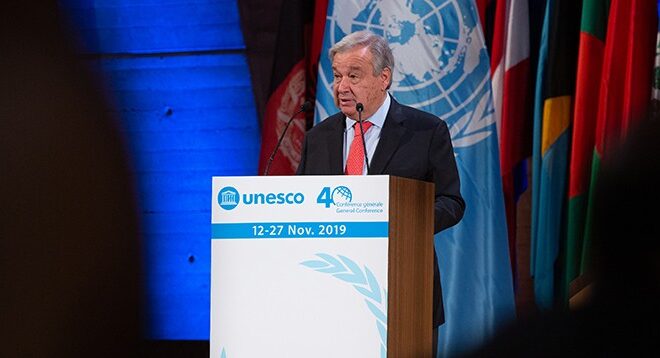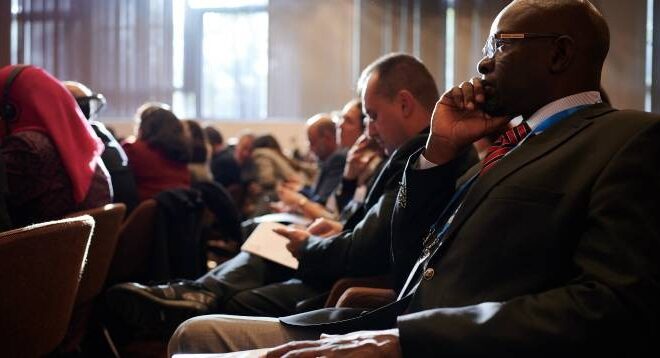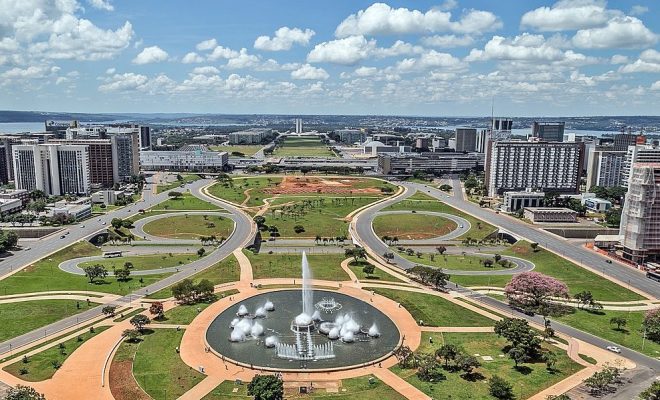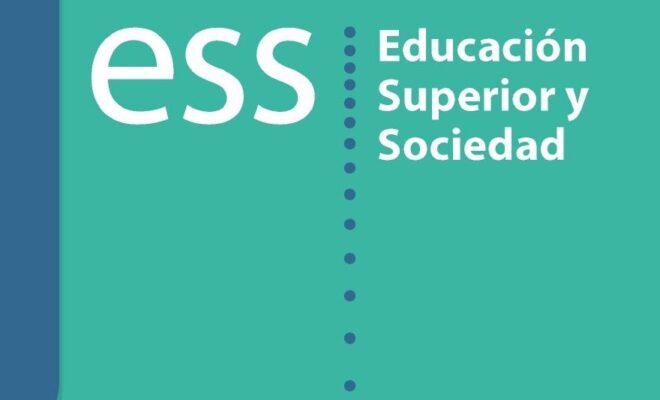Ministers meet at UNESCO to discuss inclusion and mobility in higher education
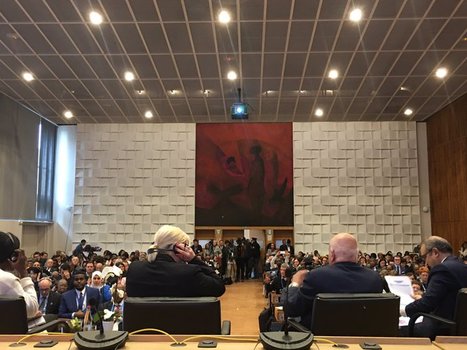

The first global ministerial meeting to debate inclusion and mobility in higher education was held on November 13, 2019 in Room II at the Headquarters of UNESCO. The Director-General of UNESCO, Audrey Azoulay, opened the activity by calling attention to the role of the organization with regard to these issues, from the time the signing of the Regional Agreement on Higher Education of Mexico was promoted in 1974, up until the Buenos Aires Convention in 2019. She affirmed that “the time has come to change from a regional focus to a global one” and emphasized the need to approve the Global Convention on the Recognition of Higher Education Qualifications, “a real turning point because it will be a wellspring not only for the mobility of students and professors but also a wellspring for cooperation, intercultural dialogue and for peace”.
Before starting the debates of the day, Fernando Reimens, keynote speaker, reiterated the importance of higher education and schools teaming up to work towards the achievement of the sustainable development goals, and drew attention to the great challenges of democracy: “Just as UNESCO has advocated for the essential freedom for the exercise of journalism, it must advocate for academic freedom and for the elimination of the barriers that are being erected to disrupt academic exchange and mobility,” he argued.
Voices and actions in favor of inclusion and mobility
The first panel of the day on inclusion, moderated by Borhene Chakroun (UNESCO), had as its first presenter, Rector Aníbal Jozami of the National University Tres de Febrero, Argentina, who opened the debate with a focus on the increasing contempt for minorities. “Education must take steps to devise elements that teach respect for the other,” he said.
Tina Beaudry-Mellor, Minister of Advanced Education of Saskatchewan and member of the Council of Ministers of Education of Canada, drew attention to the importance of recognition of studies and degrees at the transnational level.
Anwar Horani (Syria), as part of the UNESCO Qualifications Passport program, shared her testimony as the first refugee to benefit from the instrument, which had enabled her to access the public scholarship system in Norway.
The second panel of the day was led by the UNESCO International Institute for Higher Education in Latin America and the Caribbean (IESALC). Its Director, Francesc Pedró, opened the debate with the question: What policies or measures have your higher education systems or institutions considered, in order to promote mobility nationally and internationally from your countries?
Iselin Nybø, Minister of Research and Higher Education of Norway, said that improving student mobility is a priority because international cooperation is essential to face the great challenges of today. She expressed the interest of her government in 50% of Norwegian students having a stay abroad and recognized the value of the UNESCO Qualifications Passport program “because when you have to flee, you leave without your academic record and when you are in other countries, you want to work and most of the time you don’t have your qualifications at hand”.
Brian Mushimba, Minister of Higher Education of Zambia, spoke of the support that his government gives to mobility, for example, to a contingent of students participating in mobility programs with other countries, physically or virtually, as well as to displaced persons from other countries, which is why they consider the Qualifications passport program, of which they are the first beneficiary country in Africa, a great opportunity for mobility.
Jill Downie, Vice Chancellor for academic affairs at Curtis University in Australia, took the floor to share country figures: in year 2018, Australia had 400,000 mobilized students; at Curtin university 26% of the students were international; and 17% from disadvantaged families. They promote the ideal of a global campus: “We see ourselves very much as a global university, meaning that we are inclusive but also part of a global network”, she said.
For the International Youth Organization for Ibero-America (OIJ for its spanish abbreviation), academic mobility is not only a strategy of innovation, knowledge and cooperation, but also an opportunity to live, to transform, to become a global citizen. According to Alejandro Blancas, Director of OIJ, “Nevertheless, in the Latin American context, mobility continues to be a privilege because of its high costs, limited information and limited opportunities, so it is important to promote it to break the cycle of poverty and improve the conditions of accessing decent work”.
Pillars of a common mission
In his wrap-up following the interventions by the panel, Pedró recalled that IESALC had published a report on mobility that touches on many of the issues discussed by the panel. He then gave the floor to the ministerial representatives. Argentina took the opportunity to announce the achievement of 13 countries having signed and ratified the Buenos Aires Regional Convention.
In closing, the Director of IESALC stressed that inclusion and mobility, although different, should be considered in parallel, and stressed the importance of promoting the Global Convention on the Recognition of Higher Education Qualifications and joint effort.
Stefania Giannini, UNESCO Assistant Director-General for Education, reaffirmed the need for higher education in order to achieve the 17 SDGs and called on politicians, policy makers, governments, researchers and teachers to share the conviction that “together we can build new systems of higher education that are open, inclusive, reliable, and with quality assurance, the four pillars of our common mission. I ask you to strongly support the adoption and implementation of the Global Convention on the Recognition of Higher Education Qualifications”.
RELATED ITEMS
